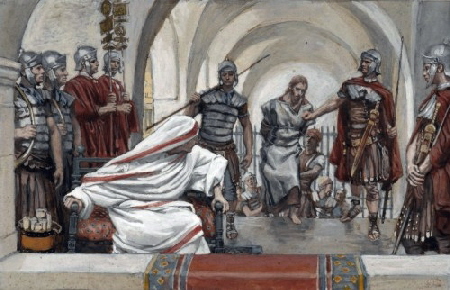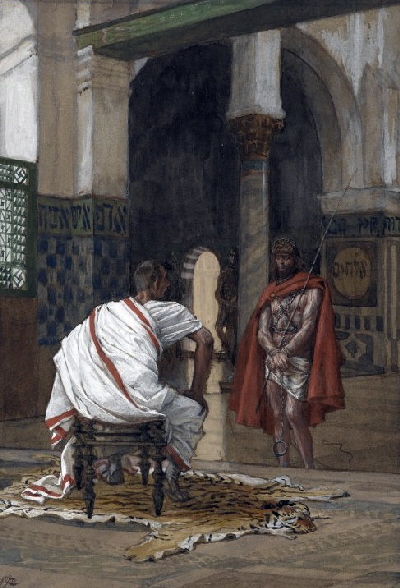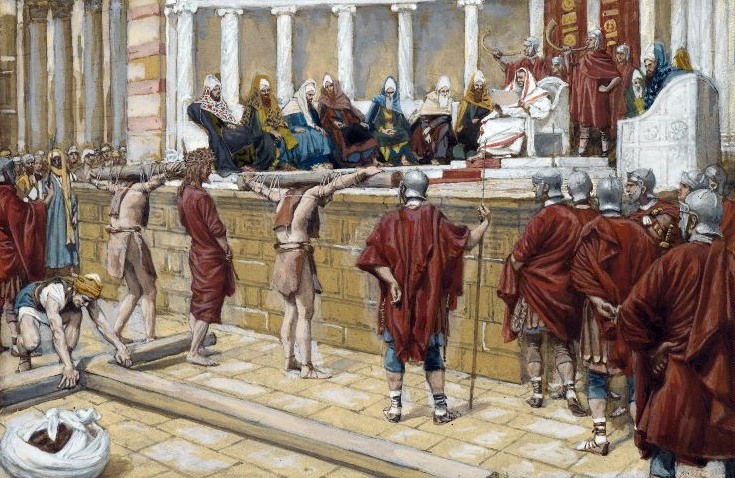|
<< Mark XV: At Pilate's Palace >>
 IT was Friday in the early morning as the priests led the Lord from the palace of Caiaphas to Pilate. The high priest's palace probably stood near the temple. Perhaps they now crossed the bridge which led to the hill of Zion, where the great palace stood, built by Herod and now used by Pilate when he was in Jerusalem. The priests would not go into the heathen's house, for they would be defiled and unable to take part in sacrifices still to be made at this Passover season. So Pilate came out to them, and sat, in his chair on a raised pavement outside the gate. IT was Friday in the early morning as the priests led the Lord from the palace of Caiaphas to Pilate. The high priest's palace probably stood near the temple. Perhaps they now crossed the bridge which led to the hill of Zion, where the great palace stood, built by Herod and now used by Pilate when he was in Jerusalem. The priests would not go into the heathen's house, for they would be defiled and unable to take part in sacrifices still to be made at this Passover season. So Pilate came out to them, and sat, in his chair on a raised pavement outside the gate.
The priests began to accuse the Lord. "We found this fellow perverting the nation," they said, "and forbidding to give tribute to Caesar, saying that he himself is Christ a King." We know how untrue it was, and what the Lord had said when they showed Him the tribute money. Pilate went within into the judgment-hall of the palace", and the Lord was led before him. There he questioned the Lord of His kingdom. He said, "I am a king." "My kingdom is not of this world."
Pilate knew that the Lord had done no wrong. He tried to release Him, for it was the custom to release some prisoner at the feast; but they asked for Barabbas, a robber and murderer, and cried out that Jesus should be crucified. The voices of the priests and people grew loud and angry. Pilate was afraid to oppose them. He washed his hands in water before them, as if that could free him from guilt, and delivered Jesus to their will. The Lord was scourged as was the custom before crucifixion, and the soldiers in the palace put on Him a scarlet robe and a crown of thorns and put a reed in His hand, like a sceptre, and mocked Him saving, "Hail, King of the Jews!"
 Once more the Lord came forth before the people, wearing the robe and crown, and we believe that the Lord Himself spoke the words, "Behold, the man!" The priests and people cried, "Crucify him." Who was in truth the perfect man and king? The priests driven on by cruel passion, Pilate fearing to do right, or the Lord who conquered every selfish feeling, and who stood before them in the strength of perfect truth and greatness? Once more the Lord came forth before the people, wearing the robe and crown, and we believe that the Lord Himself spoke the words, "Behold, the man!" The priests and people cried, "Crucify him." Who was in truth the perfect man and king? The priests driven on by cruel passion, Pilate fearing to do right, or the Lord who conquered every selfish feeling, and who stood before them in the strength of perfect truth and greatness?
And straightway in the morning the chief priests held a consultation with the elders and scribes and the whole council, and bound Jesus, and carried him away, and delivered him to Pilate. And Pilate asked him, Art thou the King of the Jews? And he answering said unto them, Thou sayest it. And the chief priests accused him of many things: but he answered nothing. And Pilate asked him again, saying, Answerest thou nothing? behold how many things they witness against thee. But Jesus yet answered nothing; so that Pilate marvelled.
Now at that feast he released unto them one prisoner, whomsoever they desired. And there was one named Barabbas, which lay bound with them that had made insurrection with him, who had committed murder in the insurrection. And the multitude crying aloud began to desire him to do as he had ever done unto them. But Pilate answered them, saying, Will ye that I release unto you the King of the Jews? For he knew that the chief priests had delivered him for envy. But the chief priests moved the people, that he should rather release Barabbas unto them. And Pilate answered and said again unto them, What will ye then that I shall do unto him whom ye call the King of the Jews? And they cried out again, Crucify him. Then Pilate said unto them, Why, what evil hath he done? And they cried out the more exceedingly, Crucify him. And so Pilate, willing to content the people, released Barabbas unto them, and delivered Jesus, when he had scourged him, to be crucified.
And the soldiers led him away into the hall, called Praetorium;and they call together the whole band. And they clothed him with purple, and platted a crown of thorns, and put it about his head, And began to salute him, Hail, King of the Jews! And they smote him on the head with a reed, and did spit upon him, and bowing their knees worshipped him. And when they had mocked him, they took off the purple from him, and put his own clothes on him, and led him out to crucify him.---Mark XV. 1-20.
Author: William L. Worcester 1904
Spiritual Correspondences
Priests >> The Lord in the power of His love >> Will
Kings >> The Lord in the power of His Truth >> Understanding
Jewish priests >> Corrupted Love or evil; evil will compels the understanding to carry out its purpose
Pilate >> Corrupted Truth or falsity; understanding follows the will (the priests urged Pilate and he dared not refuse)
The choice was made between the Lord and Barabbas >> Releasing the spirit of violence and murder, and rejecting the true manliness of the Lord
The crown of a King >> An emblem of wisdom
The purple robe >> The love from which a king rules
The soldiers arrayed the Lord as a King and mocked Him >> The contempt which the Jews were showing for the Lord as the heavenly King and for His kingly power
The Lord told Pilate that He was a King in bearing witness to the truth >> He was resisting and controlling the evil passions and evil spirits which were swaying the multitude before Him; he was standing firm in the perfection of the Word of Truth
Spiritual Meaning
COERCION OF THE WORLD BY THE CHURCH.
" THE governor" is the government of the world, the rule of natural law. Before this Jesus stands, confessedly the fulfilment and exemplification of the Scriptures " the King of the Jews." To the many accusations by selflove and perverse doctrines He answers nothing, for they do not touch the Reality which He is. It is the Passover, a feast of condemnation and a feast of release. Jesus stands for the subjection of the self to the Divine love of doing good ; and Barabbas, for the murderous turbulence and violence of the self, throwing off restraint. We remember Christian centuries in which the church with its Inquisition stood for cruelty and violence, and compelled the rulers of the world to do its bidding. We recognize the same tendency, in the love of gain from holy things, to enmity and violence, whenever it is crossed.
All that tendency to resentment and violence the Lord was now meeting, and subduing in Himself by the power of the Divine Love. The conflict was tremendous, the victory complete. Quietly and gently He bore all that they could do to Him.
 |
Not Pilate, but the priests, condemned Him. Not natural, moral, or civil law, but the church, has incited the cruelest things that have ever been done in Christendom. And this has been because the love of appropriating to self the holy good and the holy truth of the Lord, is the cruelest, wickedest thing there is in the heart of man. The moral good of the community, the moral sense, protests; though not understanding the evil, which is as a dreadful dream. The moral and civil rule is free from the blame. The tyranny of the church bears all before it. The world yields, accepting the judgment of the church of her own King. They ignore the humility and unpretentiousness with which the Lord came to save men, and ridicule His claim to royal goodness and truth and power. In His own raiment of humility, as the truth of God accommodated to men in love and mercy, they crucify Him. Another Simon, from a Gentile country, their violence compels to share in His condemnation.1 (Author: John Worchester, 1898. Matthew's Gospel.)
1. "He bearing His cross," means bearing His own condemnation. To bear it for Him would be an act of sympathy. Simon was "the father of Alexander and Rufus," who appear to have been well known Christians later. (ROMANS xvi. 13.)
Pictures: James Tissot ----Courtesy of the Brooklyn Museum
|
|